
Naming every expedition participant in a telepresence-enabled mission is next to impossible! Many from dozens of institutions across the country have provided input into the expedition plan and are expected to participate. However, we've assembled information about the members of the science and remotely operated vehicle teams who are physically onboard NOAA Ship Okeanos Explorer, and whose voices you are likely to hear most often when watching the live video. And of course, none of this exploration would be possible without the work of the dedicated NOAA Commissioned Officer Corps and civilians who operate NOAA Ship Okeanos Explorer as part of NOAA's fleet managed by NOAA's Office of Marine and Aviation.
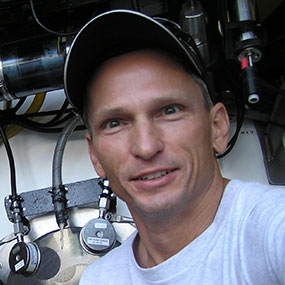
Dr. John R. Smith has served as the Marine Geophysical Specialist and the Science Program Director for the University of Hawaii Undersea Research Laboratory (HURL). He has used various acoustical and in situ methods to study the seafloor and sub-seafloor in many of the world’s oceans, specializing in multibeam bathymetry and backscatter data collection, processing, and interpretation. His research projects have focused on the mapping of seamounts and the unstable flanks of oceanic islands that can fail and cause tsunamis. Dr. Smith has also become involved in deep and shallow-water benthic habitat mapping in support of fisheries assessment and management, along with other special applied research projects such as environmental and engineering studies prior to seafloor mining, the laying of underwater power cables, and seawater A/C pipelines. As more areas of the high seas have been set aside as marine national monuments or other protected area designations, he has focused on projects in these regions, providing critical baseline and other data to accelerate discovery, delineate features for more targeted study, and assist with resource management.
John received his Bachelor of Science degree in Geological Oceanography from Florida Tech, worked in the offshore petroleum exploration survey industry for several years in the Gulf of Mexico and Caribbean, and then returned to graduate school at the University of Hawaii at Manoa for his Masters and Doctoral degrees, both in Geological Oceanography as well, and eventually a position with HURL. There, he managed the seafloor mapping program; carried out data processing and research; and served in the role of scientific manager, administering all aspects of the science program including peer reviews, panels, scientific equipment upgrades, scheduling of field programs, and functioning as the liaison between scientists, operations, and administration. A bonus of his career path is that he gets to sail to remote areas not often visited, dive in human occupied submersibles, and occasionally operate underwater robotic vehicles.
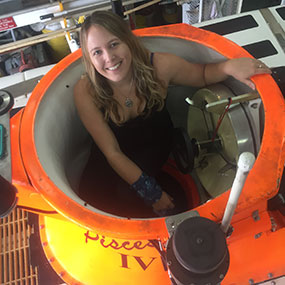
Co-science Lead, University of Hawaii
Meagan Putts is a deep-sea researcher studying coral and sponge communities. She is part of the experienced team of scientists at the University of Hawaii analyzing data collected by the CAPSTONE project in the Pacific and is leading the effort to make Hawaii Undersea Research Laboratory's (HURL) archive available online. She is also an artist and teacher who enjoys incorporating aspects of marine ecosystems into her artwork. Meagan completed her Masters in Marine Science at Hawaii Pacific University in Honolulu, Hawaii, and her Bachelors of Science in Marine Science and Visual Arts at Eckerd College in St. Petersburg, Florida.
Meagan’s research has been focused on understanding the development and community structure of deep-sea precious coral communities, which led her to her initial work with the Okeanos Explorer. In 2015, she planned and helped orchestrate a dive, via telepresence, off the southern point of Hawaii during the 2015 Hohonu Moana Expedition. She utilized the data collected to compare varying age coral communities on the Hawaiian lava flows. As deep-sea coral species grow at extremely slow rates, research on these lava flows provide a known maximum age for each community since new communities begin to form on top of the lava substrate as soon as it cools. This allows for the examination of community development across longer time scales than would be normally possible within a human lifetime.
This will be Meagan’s third expedition aboard the Okeanos Explorer. She has previously sailed as an Explorer in Training, gaining invaluable experience mapping the deep Pacific seafloor. She is excited to be headed back out to sea as the biology science lead exploring the Musicians Seamounts in this final CAPSTONE mission. In the future, she plans to pursue her Ph.D. and immerse herself in further in her career as a deep-sea benthic ecologist.
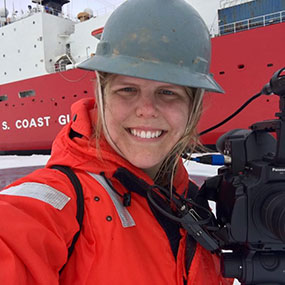
Video Producer - Global Foundation for Ocean Exploration
Caitlin Bailey holds a MFA in Science and Natural History Filmmaking from Montana State University and a B.S. in Animal Biology from Texas A&M University-Corpus Christi. Her background includes fieldwork with sea otters in Alaska, lab research on wild mice vocalizations, and mentoring undergraduate students in biology. In pursuit of her filmmaking career, Caitlin held a writing and film internship at NASA Goddard Space Flight Center and worked as a camera operator and stage manager with Montana PBS. Before her current position on the Okeanos Explorer, she served as a video engineering intern onboard the E/V Nautilus. This is her first expedition onboard the Okeanos Explorer and she is looking forward to being a contributing member of the video-production team at the Global Foundation for Ocean Exploration. Caitlin currently resides in San Antonio, Texas where she enjoys photography, SCUBA diving, and volunteering for TEDx events.
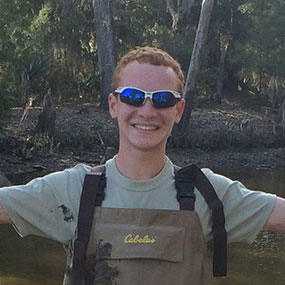
Sample Data Manager
Originally from Gilroy, California, Nolan Barrett recently graduated (Class of 2017) from the College of Charleston, South Carolina, with a BS in Marine Biology and a minor in Chemistry. He wishes to pursue an MD/PhD to focus on researching marine natural products, their uses in human medicine, and the chemical ecology of the organisms from which they originate. His research background includes alligator exotoxicology with the Guillette Jr. Lab at the Hollings Marine Lab and Medical University of South Carolina (MUSC), natural products discovery of endosymbiotic microbes in the Hamann lab of MUSC, and biosynthesis and screening of marine natural products in the Wang and Wright Labs at the Harbor Branch Oceanographic Institute (HBOI) at Florida Atlantic University. Presently, he is a laboratory assistant in the Wright lab at HBOI, preparing applications for MD/PhD programs, and participating in the Okeanos Explorer dives from home. His duties aboard the Okeanos Explorer will be managing data and sampling as well as learning a great deal from the science leads and everyone else onboard. While Nolan has participated as an onshore science correspondent, this is his first time participating onboard an Okeanos Explorer expedition. Outside of his research, Nolan enjoys a vast number of hobbies and interests ranging from being an avid home cook and Ultimate Frisbee player to studying martial arts and fiction writing.
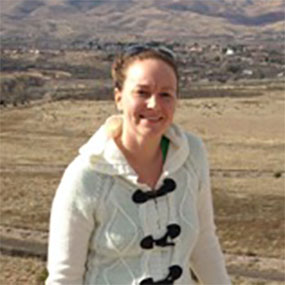
Hydrographer
Amanda Bittinger began her career in hydrography as a NOAA Corps Officer aboard NOAA Ship Rainier. She has since gained 11 years of experience, working for corporate and private industry offshore and in field offices in the United States, Europe, Central America, and the Central Pacific. She has worked on a wide range of hydrographic surveys purposed for navigation, dredging, wind farms, seismic, pipelines, cable routes, and exploration. Her favorite survey was a cable route on the Adriatic.
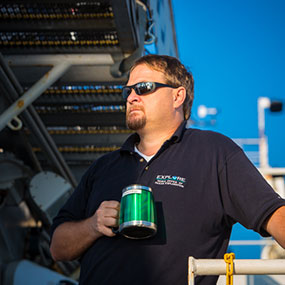
Electronic Systems Engineer - Global Foundation for Ocean Exploration
Roland Brian brings 29 years of experience and a keen eye for precision HD video to the program as a video/satellite and telepresence engineer. Roland began his career in the U.S. Air Force where he worked as a Satellite Communications Engineering Technician with visions of working on the U.S. Space Station. He traded in that quest for one of deep-ocean exploration and sharing beautiful imagery with the world. He has worked with the NOAA Office of Ocean Exploration and Research (OER) and the Okeanos Explorer Program since 2009 and has been engaged in every telepresence-enabled remotely operated vehicle (ROV) expedition. He has also provided services for other projects using OER's mobile telepresence system, including the 2012 Ring of Fire Expedition. His duties aboard NOAA Ship Okeanos Explorer include operation and maintenance of the ship's Telepresence and video systems, including on ROV Deep Discoverer and the Seirios camera platform. Again, Roland's experience embodies the breadth and depth of knowledge the OER program encourages. When not fine-tuning the video and telepresence systems or training and mentoring new team members, he's actively involved in the editing process of our ever-expanding ocean exploration video library. While not at sea, Roland enjoys life with his wife and family in sunny Sarasota, Florida.
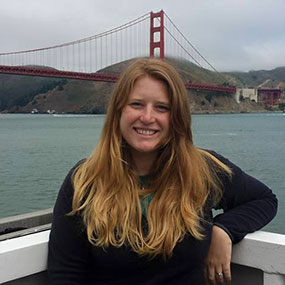
Expedition Coordinator, NOAA Office of Ocean Exploration and Research
Kasey Cantwell is a Field Operations Specialist with NOAA's Office of Ocean Exploration and Research (OER). Kasey has a Master of Science degree in Marine Affairs and Policy and Marine Geology and Gepophysics, and a Bachelor of Science degree in Marine Science and Biology, both from the University of Miami Rosenstiel School of Marine and Atmospheric Science. Kasey is responsible for coordinating telepresence-enabled expeditions conducted onboard NOAA Ship Okeanos Explorer. Since joining OER in 2012, she has coordinated over a dozen expeditions and projects, including multidisciplinary expeditions to the Atlantic submarine canyons, the Marianas, Pacific Remote Islands Marine National Monument, now known as Pacific Islands Heritage Marine National Monument, and Glacier Bay National Park.
Beyond deep-sea exploration, Kasey’s background includes imagery-based mapping of coral reefs throughout the Caribbean, long-term ecosystem monitoring, and evaluating resource management strategies to improve efficiency and data quality.
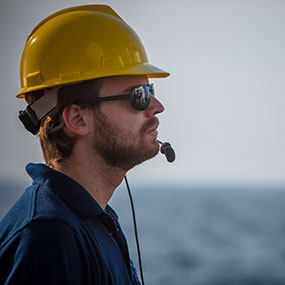
Mechanical Engineer, Global Foundation for Ocean Exploration
Joshua Carlson attended the University of Massachusetts, Dartmouth, where he received a B.S. in Mechanical Engineering with minor in Business Administration. He went on to receive his M.S. in Marine Observation Technology from the University of Massachusetts, Dartmouth School for Marine Science and Technology. Josh has a diverse background, encompassing the use of autonomous underwater vehicles (AUVs) and other types of ocean observation platforms for the purpose of studying ocean turbulence. He has designed and built a deep-ocean camera platform for filming deep-water krill in the Antarctic Ocean and provided mechanical engineering and software capabilities on the Woods Hole Oceanographic AUV Sentry during a recent cruise aboard the NOAA ship Okeanos Explorer. In his current position with NOAA’s Ocean Exploration program, Josh provides engineering, programming, and at-sea support, acting in the capacity of navigator, pilot, and co-pilot for NOAA’s 6000-meter-rated remotely operated vehicle system, Deep Discoverer. His broad range of skills in both engineering and software control development makes him an invaluable member of our team. When not traveling, Josh resides in Fairhaven, Massachusetts.
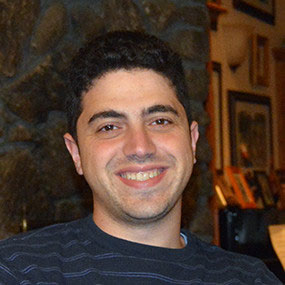
Electrical Engineer, Global Foundation for Ocean Exploration
David Casagrande holds a B.S. and M.S. in Ocean Engineering from the University of Rhode Island, completing his masters in 2013 with a focus on robotic instrumentation and computer vision. As a student, he worked on an autonomous profiling and imaging platform used for fisheries habitat assessments and counts. Since graduating, he has worked on a range of autonomous profiling and surface vehicles, measuring chemical and physical properties of the water, sonar mapping, and sea floor imaging. He has sailed on a number of research cruises to support and operate these vehicles. David also worked on underwater stereo camera systems, both standalone and ROV-based. Improving the calibration of these camera systems, required for accurate 3D reconstruction and measurements, continues to be an interest.
When not at sea, he lives in South Kingstown, Rhode Island.
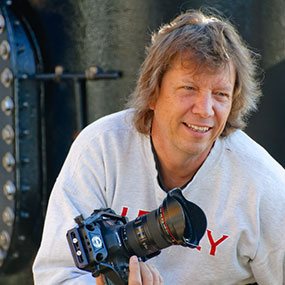
Photographer and Producer, Global Foundation for Ocean Exploration
For 34 years, Emmy-award winning photographer and producer Art Howard has helped viewers experience life through images from 50 countries and seven continents. A native North Carolinian, Art has followed researchers aboard multiple deep-sea missions, documenting the excitement and challenges of offshore reef exploration. Art will use the latest video technology to bring viewers as close as possible to life at sea from the surface to depths of 3,000 feet, capturing both the scientists and the life they seek to understand. Howard has spent the last 11 years independently producing media for the North Carolina Museum of Natural Sciences.
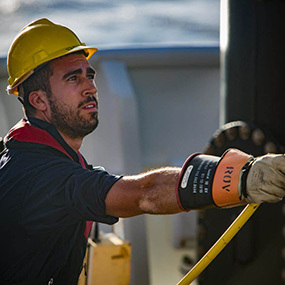
Electrical Engineer - Global Foundation for Ocean Exploration
Sean Kennison holds a B.S. in Mechanical Engineering with a minor in Engineering Mechanics from Pennsylvania State University. He first sailed on the Okeanos Explorer as an intern and member of the Engineering Group, where he performed tasks associated with the launch, operation, and recovery of the ROV system. He has also worked shoreside, designing mechanical parts for the ROVs and assisting with assembly and testing of previously and newly installed equipment. Sean also assisted with installing electronics, testing, data analysis, and troubleshooting on the vehicle. Most recently, he assisted in assembling and modifying a new bio storage box for the Deep Discoverer ROV. While at Penn State, Sean served as team leader on a number of engineering design projects.
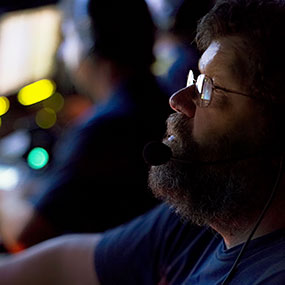
Global Foundation for Ocean Exploration
Bob has almost 50 years’ experience in broadcast engineering. Following a 37-year career with RIPBS, departing in 2006 as Chief Engineer, he worked for the Sea Research Foundation and Ocean Exploration Trust as the Senior Broadcast Engineer. He was responsible for the design, commissioning, and maintenance of the Inner Space Center located at the University of Rhode Island Graduate School of Oceanography. He also worked on many research vessels and supported telepresence operations from NOAA Ship Okeanos Explorer, E/V Nautilus, R/V Endeavor, and R/V Atlantis, plus many other UNOLS ships.
Bob is married and has six adult children, nine grandchildren, and a great-grandson. He and his wife Donna play French horn and are active in many community music ensembles in Rhode Island.
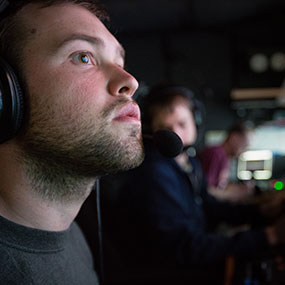
Electrical Engineer - Global Foundation for Ocean Exploration
Jeff Laning holds a B.S. in Electrical Engineering from the University of Vermont. He started his career as an intern with Greensea Systems, Inc., where he worked on design, development, and integration of components and software associated with remotely operated vehicles and autonomous underwater vehicle systems.
Jeff is one of our youngest members and came to our group with a desire to learn new and complex electrical systems. Electrical engineers interested in and capable of working on deep submergence systems are one of the hardest positions to fill. Jeff has done a great job as a key member of the team that built Deep Discoverer and has become a skilled pilot, co-pilot, and navigator. His contribution to ocean exploration is certainly something to be proud of and we hope that other young engineers will be inspired by what he has accomplished. Jeff currently resides in Vermont.
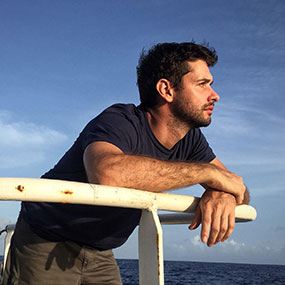
Mechanical Engineer - Global Foundation for Ocean Exploration
Andy earned a Bachelor's in Ocean Engineering from Texas A&M. He then obtained a Master's in Mechanical Engineering focusing on Robotic Artificial Intelligence and Systems Engineering from Embry Riddle in Daytona Beach. After college, he lent his knowledge to the oilfield service industry for four years, living in various places including Wyoming, North Dakota, and Alaska while on assignment. Recently, he has come back to the mechanical and software side of engineering to contribute to the team at the Global Foundation for Ocean Exploration. He loves traveling, exploring, and being outdoors.
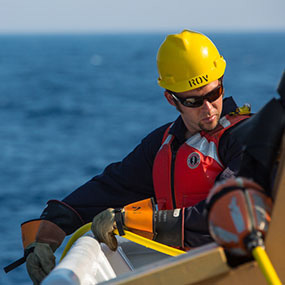
Ocean/Mechanical Engineer, Global Foundation for Ocean Exploration
Karl McLetchie is a graduate of the Massachusetts Institute of Technology. He holds B.S. and M.S. degrees in Ocean and Mechanical Engineering. After graduating, he worked as an engineer on the development of autonomous underwater vehicles and as a naval architect on the design of high-speed aluminum vessels. After a brief, two-year stint of delivering sailboats around the Caribbean, he started his own contracting company, SeaKnowledge, in 2008. Through SeaKnowledge, Karl works on the mechanical design and operation of underwater vehicles. Karl has worked on Okeanos Explorer for six seasons, in all positions on the ROV Team from Winch Operator to Dive Supervisor. When not on assignment for Ocean Exploration, Karl resides in Pemaquid, Maine.

Global Foundation for Ocean Exploration
Jon Mefford holds a B.S. in Aerospace Engineering from the University of Texas, and an M.S. in Mechanical Engineering from the University of Hawaii. He began his career working as a software test engineer on the Space Shuttle program for several years before moving to Hawaii to pursue his master's. During his time as a graduate student he participated in a number of research expeditions aboard the Okeanos Explorer as a member of the ROV Team. This experience was invaluable to him as he worked on his degree, which focused on the design, development, and implementation of control systems for marine robotics.
Since that time, Jon has returned to work in the aerospace industry as a software and test engineer on the Orion Space Program. However, he remains passionate about both space and deep sea exploration and appreciates the many parallels that can be drawn between them. He is excited to be rejoining the ROV team this year and helping them to fulfill their mission of exploring the world’s oceans. Jon currently resides in Denver, Colorado.
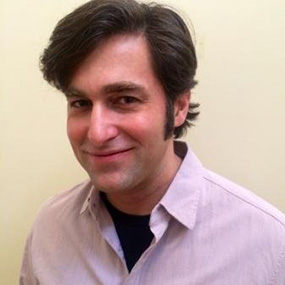
Software/Data and Satellite Engineer - ROV Pilot/Copilot
Andy started his professional career in the U.S. Navy where he ran a small electronic test system calibration laboratory and instructed NATO students in Satellite Ground Station repair. Following the Navy, he obtained a B.A. in History and a M.S. in Computer Science from the University of Vermont before hiring on as the Lead Software Engineer at Greensea Systems. During his tenure at Greensea, Andy designed, developed, and supported over 40 widely varying custom robot control systems and their operator interfaces for government and industry. Notably, Andy was the software lead on our very own Deep Discoverer and Seirios remotely operated vehicles.
Andy reports he so enjoyed working with the NOAA Office of Ocean Exploration and Research team, and their exploration mission, that he asked to join. Andy now splits his time between developing software; managing science and engineering data; maintaining the satellite communications system; and navigating, piloting, and co-piloting the deep-submergence vehicles. During his free time you can often find him in Monkton, Vermont.
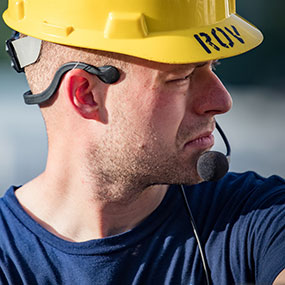
ROV Engineer, Global Foundation for Ocean Exploration
Dan Rogers has a diverse background in engineering, media production, and education. Daniel holds a B.S. in Physics and earned a M.S. in Mechanical Engineering from the University of Hawaii in 2013. Before starting his graduate program, Daniel worked as a Science Educator at the Bishop Museum in Honolulu. He continued to work with the museum as a Digital Media Producer while in school, partnering with the Polynesian Voyaging Society to produce a 30-minute film about traditional sailing and star navigation for the fulldome planetarium format. He has now been working as an ROV engineer and videographer on the Okeanos Explorer for over four years.
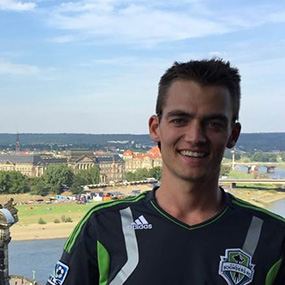
ROV Engineer - Global Foundation for Ocean Exploration
Levi Unema is an Eagle Scout from Lynden, Washington. He holds a B.S. in Electrical Engineering along with a Certificate in Electric Power Engineering from Michigan Technological University. Levi has experience in a number of different industries, ranging from the railroad, to steel mills, to automotive supplier light manufacturing.
Currently living in west Michigan, he enjoys being outdoors and staying active.
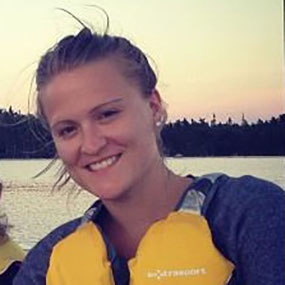
Web Coordinator, NOAA Office of Ocean Exploration and Research
Katie Wagner is the Communications & Public Affairs Specialist in NOAA’s Office of Ocean Exploration and Research (OER), on contract with CollabraLink Technologies. Her work focuses on communicating NOAA’s ocean exploration efforts and accomplishments to various audiences and managing outreach activities for NOAA Ship Okeanos Explorer. Prior to joining OER, she worked in NOAA’s Office of Response and Restoration to raise the visibility of the agency’s effort to protect and restore coastal and marine resources following oil spills, hazardous waste releases, and vessel groundings. She has also worked at EPA on the Hydraulic Fracturing Study, the International Union for Conservation of Nature (IUCN) on blue carbon and Arctic issues, and at Fisheries and Oceans Canada on marine protected area planning. Katie holds a Masters in Marine Management and a Bachelor of Science in Marine Biology from Dalhousie University.
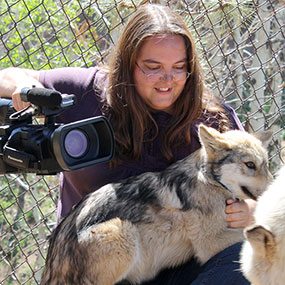
Video Producer - Global Foundation for Ocean Exploration
Annie White is an award-winning documentary filmmaker, photographer, and biologist who specializes in conservation biology and animal behavior. She holds a B.A. in Environmental, Population and Organismic Biology from the University of Colorado and is currently finishing an MFA degree in Science and Natural History Filmmaking at Montana State University.
Her career has taken her from collecting limestone samples and fossils in Wyoming, to studying wild wolf behavior, to filming cougars and grizzly bears. The years she spent living and traveling with captive ambassador wolves kick-started her interest in science education and inspired her to reach out to larger audiences through film.
Her credits include projects for National Geographic WILD, Curiosity Stream, the Yellowstone Wolf Project, and various other non-profit groups. Now the writer and producer for VisionHawk Films, Annie spends her time developing broadcast TV series about wildlife.
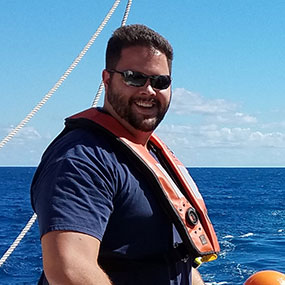
Mapping Lead, NOAA Office of Ocean Exploration and Research
A native of Long Island, New York, Mike took a deep interest in ocean science at a young age growing up in and on the water. After graduating from SUNY Geneseo with a degree in geological sciences, Mike continued his education at the School of Marine and Atmospheric Sciences at Stony Brook University. At Stony Brook, he worked on several projects, including acoustic mapping of coastal areas, coastal sediment management, remote sea level monitoring, submarine groundwater discharge, and applying his GIS proficiencies. Mike’s M.S. thesis focused on the processing of multibeam backscatter and its relationship to the physical characteristics of the seafloor. After completing a graduate certificate in geospatial science and earning a reputation as a reliable field scientist, Mike started a new position as a hydrographic analyst with NOAA’s Sandy Integrated Ocean and Coastal Mapping team at the Center for Coastal and Ocean Mapping (CCOM) at UNH. At CCOM Mike processed outside to NOAA hydrographic datasets, examined additional applications for topobathymetric lidar, collaborated on a seafloor imaging device, and served as a physical scientist supporting hydrographic surveys. As the newest member of the Okeanos Mapping Team, Mike is truly excited to support their mission exploring the oceans. During his off hours, Mike can be found cooking, hiking, or watching movies.